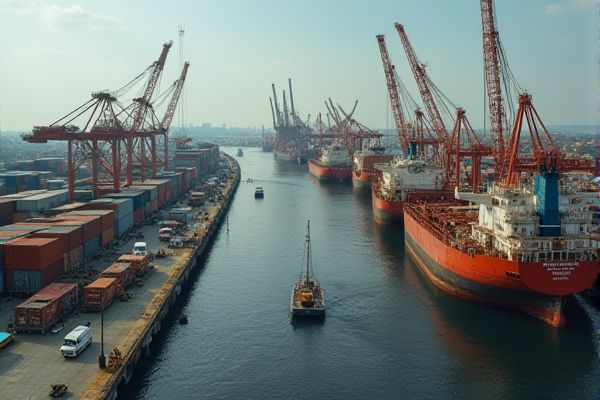
Kenya's job market offers a diverse range of opportunities across various sectors, including agriculture, information technology, finance, and healthcare. The growing tech ecosystem in cities like Nairobi has led to the rise of numerous startups, creating demand for skills in software development, digital marketing, and data analysis. Government initiatives aimed at enhancing vocational training and entrepreneurship support are also bolstering job creation, particularly for youth. Networking and leveraging online job platforms can significantly improve your chances of finding suitable employment in this dynamic environment.
Job Description
Import jobs in Kenya typically involve managing the logistics of bringing goods from foreign markets into the country. Positions may include roles in customs clearance, procurement, and inventory management, requiring a keen understanding of local regulations and international trade laws. Applicants should possess strong negotiation skills and a background in supply chain management to navigate the complexities of import processes. Opportunities in this sector can lead to diverse career paths, offering a dynamic work environment and the chance to contribute to Kenya's growing economy.
Requirement
Job opportunities in Kenya are diverse and span various sectors including technology, healthcare, and agriculture. Employers typically seek candidates with relevant qualifications and a minimum of a bachelor's degree, alongside essential soft skills such as communication and teamwork. Familiarity with local regulations and cultural context can significantly enhance your employability. Staying updated with job portals and networking events in Kenya will help you tap into the emerging market demand effectively.
Salary and Perks Expected
The import job market in Kenya offers a variety of roles across different sectors, with salaries generally ranging from KSh 50,000 to KSh 150,000 per month, depending on experience and the specific position. Many companies provide additional perks such as health insurance, transport allowances, and performance bonuses. Your potential earnings can be influenced by the industry, with sectors like pharmaceuticals, agriculture, and manufacturing often offering higher compensation packages. Networking and gaining relevant certifications can significantly improve your job prospects and salary expectations in this competitive field.
Similar Job Names
- Import Manager
- Logistics Coordinator
- Supply Chain Analyst
- Customs Compliance Officer
- Freight Forwarding Specialist
- Procurement Officer
- Import Operations Assistant
- Trade Compliance Manager
- Shipping and Receiving Clerk
- Import Documentation Specialist
- Warehouse Manager
- International Trade Specialist
- Transportation Manager
- Export-Import Coordinator
- Customs Broker
- Inventory Control Manager
- Market Access Coordinator
- Quality Assurance Inspector
- Air Freight Operations Supervisor
- Maritime Operations Manager
Job Expectation Concept
The job expectation concept for import jobs in Kenya involves understanding the demands and responsibilities associated with this vital sector. Professionals in import positions must navigate regulatory requirements, manage supply chains, and ensure compliance with local laws. Experience in logistics, customs clearance, and negotiation skills is essential for success in this competitive field. By developing expertise in these areas, you can significantly enhance your career prospects and contribute to Kenya's growing economy.
Career Advantage and Weakness
Import jobs in Kenya offer significant career advantages, including access to a diverse range of industries such as textiles, electronics, and food products. These positions often provide competitive salaries and opportunities for professional growth in a dynamic market environment. However, a weakness in this sector is the reliance on international suppliers, which can expose you to fluctuations in global markets and trade policies. Understanding these factors can help you navigate the challenges and leverage the benefits of import jobs in Kenya effectively.
Important Thing Must Know
Import jobs in Kenya are crucial for the country's economy, facilitating the flow of goods and services that support various sectors. Key industries benefiting from import jobs include agriculture, technology, and manufacturing, which require consistent access to foreign products. Understanding customs regulations and import duties is essential, as non-compliance can lead to costly penalties or delays. Opportunities for import jobs can be found in logistics, supply chain management, and trade compliance roles, which cater to both large corporations and small businesses. Networking within industry associations and attending trade fairs can enhance your chances of securing a position in this dynamic field.
Alternative Career Options
Exploring alternative career options in Kenya's import sector can open numerous avenues for professional growth. Roles in logistics and supply chain management are vital, ensuring smooth transportation and storage of goods. Opportunities also exist in customs brokerage, where expertise in regulatory compliance and documentation is crucial for facilitating trade. Engaging in consultancy services focused on market research can help businesses navigate the complexities of international trade and enhance import strategies.
Companies List
- Kenya Airways
- Safaricom
- East African Breweries Limited
- Kenya Power
- Unilever Kenya
- Bidco Africa
- Nairobi Brewery
- Kenya Pipeline Company
- Coca-Cola Kenya
- Kenya Maritime Authority
List of Ideal City
Nairobi stands out as the primary hub for import jobs in Kenya, hosting numerous logistics and supply chain companies. Mombasa, with its strategic port, offers additional opportunities in maritime trade and customs management. Kisumu provides a growing market for import-related jobs due to its connection to Lake Victoria and international trade routes. Consider exploring positions in these cities to enhance your career in the import sector.
 jobs-kenya.com
jobs-kenya.com